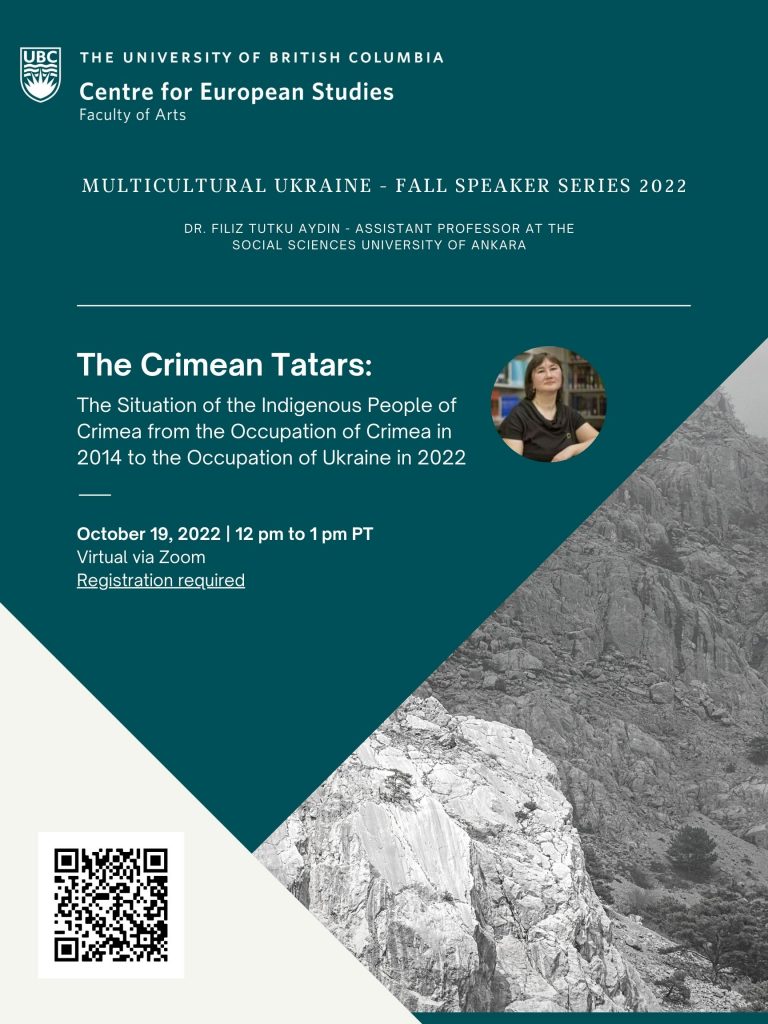Wednesday, October 19, 2022
12:00pm – 1:00pm
 Dr. Filiz Tutku Aydin , Assistant Professor at the Social Sciences University of Ankara
Dr. Filiz Tutku Aydin , Assistant Professor at the Social Sciences University of Ankara
The Crimean Tatars: The Situation of the Indigenous People of Crimea from the Occupation of Crimea in 2014 to the Occupation of Ukraine in 2022
This event will be held virtually.
Register here.
Abstract:
As Russia continues to occupy Crimea since 2014, we would like to examine the situation of Crimean Tatars, the indigenous people of Crimea. The Crimean Tatars are a Turkic-Muslim people who emerged in Crimea in the Middle Ages as a result of an amalgam of autochthonous and settler ethnic communities of the peninsula that took place within the framework of the Crimean Khanate. The Khanate was a descendent of the Chingizid Golden Horde Empire and in time developed a strong alliance and cooperation with the Ottoman Empire. The Khanate came to an end with the Russian annexation of Crimea in 1783, and Russia colonized the peninsula in the 19th century, leading to the exodus of indigenous Crimean Tatars towards the Ottoman territories in the Balkans and Anatolia. The remaining Tatars who developed nationalism in the beginning of the 20th century obtained their autonomous republic in the Soviet Union, but Russian de-Tatarization of the peninsula culminated in the deportation of all the indigenous population under Stalin’s orders on 18 May 1944. The Crimean Tatars managed to return to their homeland by the early 1990s, and obtained de facto recognition from independent Ukraine, where Crimea belonged in the post-Soviet period. The fate of Crimean Tatars deteriorated grossly with the Russian occupation and so-called “annexation” of Crimea in 2014, and Crimean Tatars had to suffer again under a new phase of colonialism. While a minority of Crimean Tatars were exiled to mainland Ukraine and joined the Ukrainian struggle to take back Crimea in a newly achieved political cooperation with Ukraine, the Crimean Tatar diaspora rejuvenated to support this effort. With the occupation of Ukraine in 2022, the Crimean Tatars in Crimea and occupied regions of Kherson and Zaporizhzhia were further persecuted. We would like trace the diverse trajectories of Crimean Tatars throughout these events and evaluate the condition of national identity and national movement of Crimean Tatars today.
Bio:
Dr. Filiz Tutku Aydin is an Assistant Professor at the Social Sciences University of Ankara. She received her Ph.D. in Political Science from the University of Toronto in 2012 and taught there. She returned to Turkey under TUBITAK returning scholars program in 2014. She has a book titled Émigré, Exile, Diaspora and Transnational Movements of Crimean Tatars: Preserving the Eternal Flame published by Palgrave, and she edited a book on the occupation of Crimea in Turkish. She has published in Communist and Post-Communist Studies and several journals in Turkey and Ukraine, and has several book chapters, published in English, Romanian and Crimean Tatar. She completed a research project titled “Protection and enforcement of minority rights in the post-Soviet space between 1991-2014: Comparing the cases of Tatarstan, Chechnya in Russia and Crimean Tatars and Russians in Ukraine” funded by TUBITAK. Ms. Aydın is a member of the Crimean Tatar diaspora from Ankara, Turkey. She contributed the letter of “Statement of Concerned Scholars on the Current Predicament of the Crimean Tatars” to protest the Russian annexation of Crimea and a letter of Turkish academicians protesting the Russian Occupation of Ukraine in 2022. She participated in the Second World Crimean Tatar Congress in July 2015. She is a member of the International Committee of Crimea and one of the founders of Crimean Studies Network.
